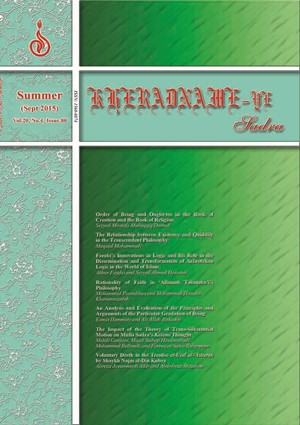-
-
List of Articles
-
Open Access Article
1 - سرمقاله
Seyyed Mohammad Khamenei -
Open Access Article
2 - Order of Being and Ought-tos in the Book of Creation and the Book of Religion
Seyyed Mostafa Muhaqqiq Damad -
Open Access Article
3 - The Relationship between Existence and Quiddity in the Transcendent Philosophy
Maqsud Mohammadi -
Open Access Article
4 - Farabi’s Innovations in Logic and his Role in the Dissemination and Transformation of Aristotelian Logic in the World of Islam
Akbar Faydei Seyyed Ahmad Hosseini -
Open Access Article
5 - Rationality of Faith in ‘Allamah Tabataba’i’s Philosophy
Mohammad Poorabbas Mohammad Hossein Khavaninzadeh -
Open Access Article
6 - The Impact of the Theory of Trans-Substantial Motion on Mulla Sadra’s Kalami Thought
Mehdi Ganjvar Majid Sadeqi Hassanabadi Mohammad Bidhendi Furugh al-Sadat Rahimpoor -
Open Access Article
7 - An Analysis and Evaluation of the Principles and Arguments of the Particular Gradation of Being
Esmat Hemmaty Esmat Hemmaty -
Open Access Article
8 - Voluntary Death in the Treatise al-Usul al-‘Asharah by Shaykh Najm al-Din Kubra
-
The rights to this website are owned by the Raimag Press Management System.
Copyright © 2017-2026







